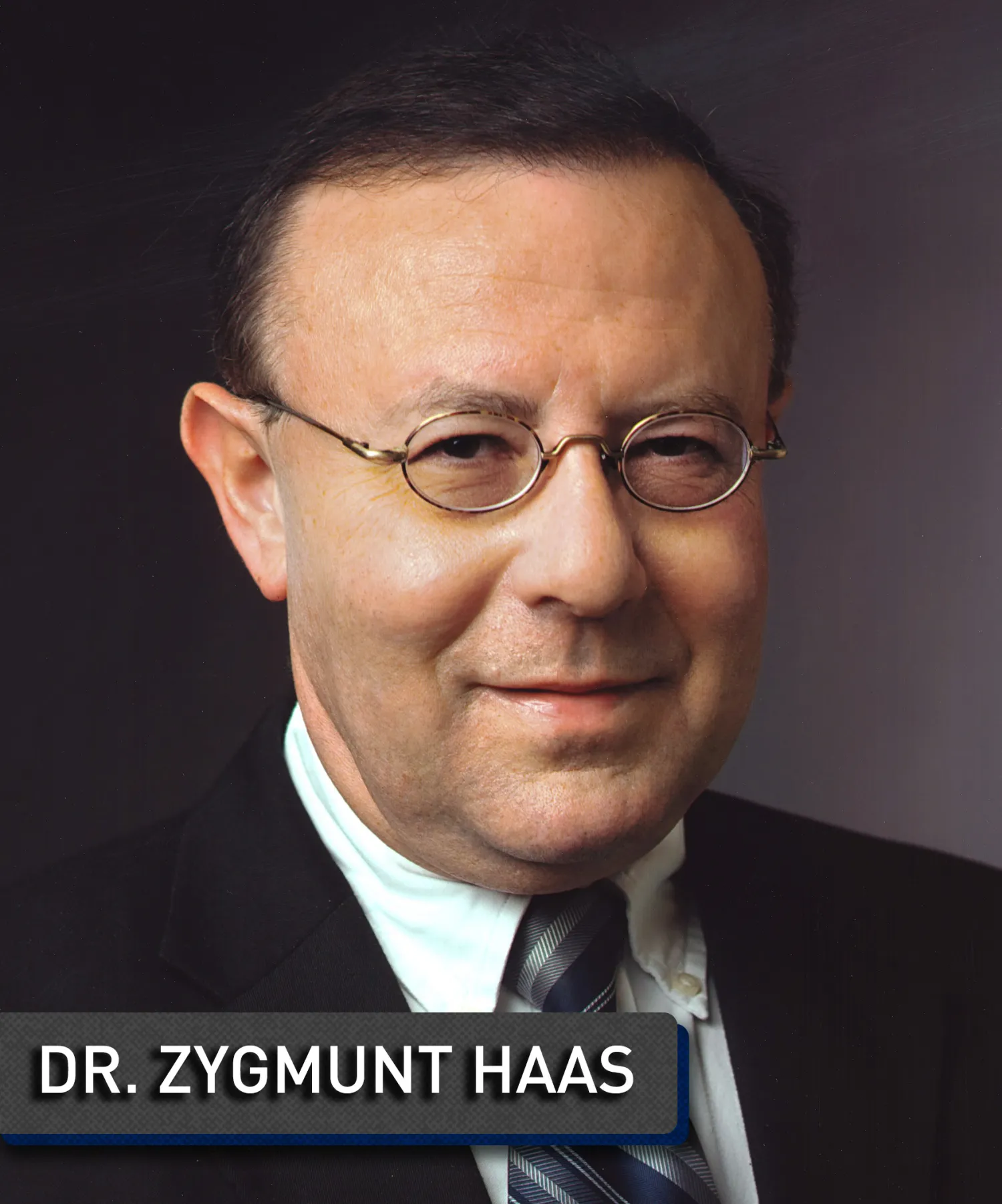Dr. Zygmunt Haas Awarded Two Prestigious Fellowship Appointments

In March 2019, Dr. Zygmunt Haas was selected as one of the 28 engineering professionals awarded with the title of the Fellow of the Institution of Engineering and Technology (IET). In order to become a Fellow of the IET, a person has to demonstrate a significant level of individual responsibility, with sustained achievement and professionalism in at least one of the engineering areas relevant to the interests of the IET.
The IET supports all areas of the engineering profession, and in particular the various aspects of multidisciplinary professional engineering. It speaks for the engineering profession on matters that are of public concern, while assisting governments in making the public aware of engineering and technological concerns. The IET frequently advises governmental bodies in making their decisions. Historically, the IET was created by the merging of two institutions: The Institution of Electrical Engineers (IEE), which dates back to 1871, and the Institution of Incorporated Engineers (IIE), which dates back to 1884. Although the IET’s main offices are located in England, the IET has worldwide membership, which currently stands at over 168,000 members.
The IET has several membership categories, which include: Honorary Fellow (HonFIET), Fellow (FIET), Member (MIET or TMIET), Associate, and Student. The community of the Fellows of the IET represents a small and exclusive fraction of the IET membership. The IET Fellows are an essential part of the IET mission, inspiring the current and the future engineers, and influencing the direction of the engineering profession.
The second fellowship for which Dr. Haas was selected as Fellow with European Alliance for Innovation (EAI) in May of 2019. It is important to note that the first group of 167 EAI members from 23 countries and five continents represented less than 0.1% of the EAI membership base. These selected EAI Fellows have demonstrated excellence in the general areas of Smart Society, Smart Cities, and Smart Health.
The EAI is a non-profit organization and a professional community, with headquarters located in Ghent, Belgium. EAI was established in cooperation with the European Commission in order to empower global research and innovation and to promote worldwide communication between technical communities of information and communication technologies. The principal objective of EAI is to contribute to the evolution of universal disciplines of research through the development of information technologies. The activities of the EAI are represented through three well-recognized areas that are at the core of humanity’s successful future: Smart Society, Smart Cities, and Smart Health. These areas are recognized as the leading-edge societal challenges that are revolutionizing human lives. The EAI organization manages events and conferences, and provides support for the members, in order to improve the rate at which innovations reach the market. EAI currently has over 150,000 members globally.
Through the EAI Recognition Program, EAI guarantees member recognition objectively, transparently and fairly, independent of location, economic condition or local funding. After more than a decade of operation as one of world’s leading professional communities and Europe’s largest technical professional society, EAI has launched the EAI Fellow initiative to recognize its members, whose efforts in the EAI Community have had a significant global impact.
Dr. Haas is a UT Dallas Computer Science professor and Distinguished Chair in Computer Science. He heads the Wireless Networks Lab (WNL). Dr. Haas is an author of over 300 technical papers and holds twenty-one patents in the fields of high-speed networking, wireless networks, and optical switching. He won a number of awards and distinctions, including “Best Paper” awards, the 2016 IEEE ComSoc AHSN Recognition Award “for outstanding contributions to securing ad hoc and sensor networks”, and the 2012 IEEE ComSoc WTC Recognition Award for “outstanding achievements and contribution in the area of wireless communications systems and networks”. Dr. Haas chaired and co-chaired several key conferences in the communications and networking areas, organized many workshops, delivered numerous tutorials at major IEEE and ACM conferences, and served as an IEEE ComSoc Distinguished Lecturer. He has organized several workshops, delivered numerous tutorials at major IEEE and ACM conferences, and has served as editor of several journals and magazines, including the IEEE Transactions on Networking, the IEEE Transactions on Wireless Communications, the IEEE Communications Magazine, the Springer Wireless Networks journal, the Elsevier Ad Hoc Networks Journal, the Journal of High-Speed Networks, and the Wiley Wireless Communications and Mobile Computing journal. He has been a guest editor of IEEE JSAC issues on Gigabit Networks, Mobile Computing Networks, and Ad-Hoc Networks. Dr. Haas is an IEEE Fellow, an IET Fellow, and a Fellow of EAI. He has served in the past as a Chair of the IEEE Technical Committee on Personal Communications (TCPC), today is known as the Technical Committee on Wireless Communications. His interests include mobile and wireless communication and networks, biologically-inspired networks, and modeling of complex systems.
ABOUT THE UT DALLAS COMPUTER SCIENCE DEPARTMENT
The UT Dallas Computer Science program is one of the largest Computer Science departments in the United States with over 3,315 bachelors-degree students, more than 1,110 master’s students, 165 Ph.D. students, 56 tenure-track faculty members, and 41 full-time senior lecturers, as of Fall 2019. With The University of Texas at Dallas’ unique history of starting as a graduate institution first, the CS Department is built on a legacy of valuing innovative research and providing advanced training for software engineers and computer scientists.




